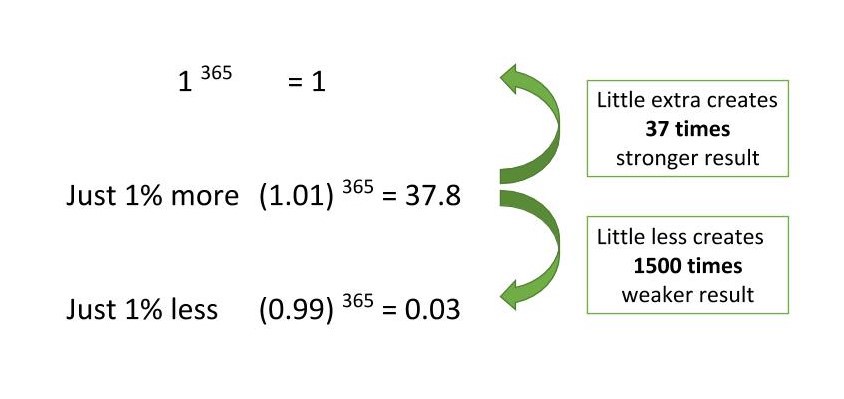In my last BLOG “Working harder or work smarter? Pick one? Pick both!” I mentioned how I admire people who combine the two sides of work because hard work alone may not get the desired results and smart work without the consistency and discipline may be insufficient to reach your objective.
Today, I would like to bring to your attention the power of consistent effort. This is not my invention, but a valid formula created by Tom O'Neil called the 1% principle. It is not a trick but simple math, and it can be adapted to any work we do.
Consider the following mathematical formula: The first equation is simply the number 1 raised to the power 365, which gives 1. The second equation is the number one with just 1% more, raised to the power of 365 which now gives us 37.8 or 38 times more. This incredible result is due to the compounding effect. This is what you get when you apply just 1% more to whatever you are doing, consistently. The example using 365 is for the days in a year. Just one 1% more than usual gives you 38 times more in a year!

I was never good at math when I was in school, and to this day, I can hardly remember my own telephone number, my office, or home postal codes. My brain is wired strangely, however, in that when a dollar sign is added to any number, my brain kicks in. For instance, when I was heading a large Canadian company with over $95M in revenue and with 13 business units or profit centres, I could tell you comfortably who was ahead in revenues compared to budget and compared to last year, and how the bottom line performed. I knew the operating profit margin of each unit. It is incredible how I could recall these financial numbers with confidence but cannot remember my own telephone number!
At that time, I did not know the Gardner’s equation, but I did know that the consistency of performance brings exceptional results. I also knew to “never quit”. This likely comes from playing soccer, which taught me that a goal can be scored in merely few seconds—and also by mistake—when a player on the other team scores a goal in their own net in error. The lesson here? The game is never over until the referee blows the whistle. Keep at it, do your best and give that extra percentage. You will surprise yourself.
Some people may say, “hey Hugh, you’ve been lucky!” I beg to disagree. It is not; for the simple reason that if winners keep on winning, it cannot be luck. Luck is when once in a while one wins, but when you regularly win or come on top, it is not luck. It is consistent performance. Winners never fear “failure”, as it is the key ingredient for the recipe of success.
As Micky Rooney once said: “You always pass failure on your way to success”. Aim for that 1% more every day.
(W-510)


